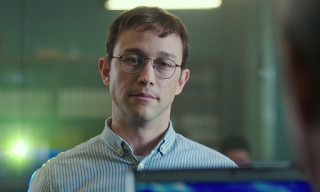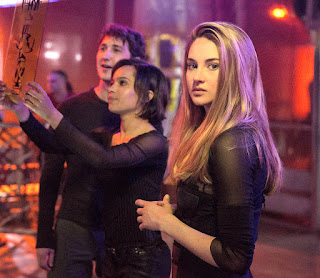Are Sully’s views of masculine emotional intimacy outdated? Clint Eastwood’s just-released Sully clearly admires its titular character, Chesley “Sully” Sullenberger, played by Tom Hanks. It presents Sully as an icon of competence, integrity, and calm under pressure. Like most such movies lionizing competent men, it relegates the wife, here played by the thrice-Oscar-nominated Laura Linney, to a background role. The movie is set in the days after Sully successfully executed an emergency water landing of US Airways Flight 1549 in the Hudson River off Manhattan, after the aircraft was disabled by striking a flock of Canada geese during its initial climb out of LaGuardia Airport on January 15, 2009. All of the 155 passengers and crew aboard the aircraft survived.
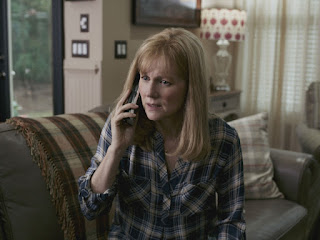
Because of this framing device, Hanks and Linney never appear together. She remains ensconced in their generic suburban cul-de-sac with what appear to be two daughters, while he and his co-pilot, played by Aaron Eckhart, are housed in a Manhattan Marriott, celebrated by the media and public, but challenged by the NTSB for failing to attempt to land the plane at nearby airports. Spousal interactions are limited to phone conversations and their exchanges uniformly hit the same note: Sully calls his wife; she proceeds to bombard him with her worries; he assures her everything will be fine. His wife rarely asks how he’s handling the fear of almost dying, the pressure of being in the media spotlight, or the scrutiny of his decision to attempt a water landing.
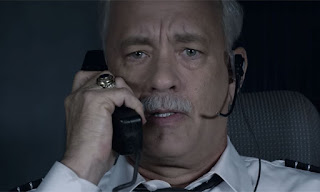
Meanwhile Sully does his (emotionally limited) best to assure her that he’s fine, and to empathize with her own media onslaught. There’s no indication she understands, or even acknowledges, the tremendous stress of his situation. Similarly, there’s no indication that Sully is annoyed by her clueless self-absorption. Rather than burden his wife with his fears, Sully saves such conversations for his (male) co-pilot, with whom he second guesses his decision and worries about his future. Perhaps, not ironically, it is the competence of Sully and his co-pilot that enabled the safe water landing and the rescue of all passengers and crew. In contrast, one senses that Sully obtains no emotional support from his wife, but sees his role in their marriage as being the stoic provider of safety–or, rather, the illusion of safety.

At the end of the movie, Sully demonstrates to the NTSB that his decision to attempt the water landing not only saved his passengers and crew but prevented the much greater disaster of a crash into densely populated areas. Eastwood is celebrating a notion of masculinity that combines competence, integrity, calmness under pressure, and a concern for the needs and fears of others. In the world of work, this notion of masculinity is extremely attractive–and no longer confined to members of the male gender. However, in the scenes of Sully’s marriage, Eastwood is expressing that same view of masculinity–one involving sublimation of one’s own needs and fears to assuage the needs and fears of others.
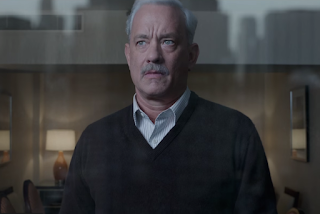
As a pilot, Sully presents an image of masculinity that assures his passengers that everything will be okay–even as he understands there is always a possibility of a crash. As a husband, Sully provides similar comfort through the assurance and false promises of security. Although contemporary cosmopolitan culture pays lip service to a desire to have men be more emotionally open, doing so would require removing the illusion of safety such masculinity provides and that so many find comforting. Eastwood would appear to not find such change desirable. I’m unclear the culture-at-large would either.
Source: www.gregoryforman.com
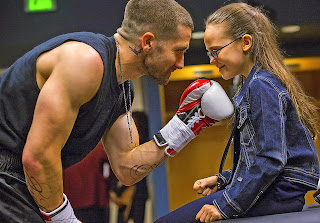
More than ever, the boxing picture has proven to be a right of passage for young actors, allowing them to prove their macho bona-fides. More often than not they totally transform their bodies in an attempt to emulate De Niro in RAGING BULL or Stallone in ROCKY. Last year, Jake Gyllenhaal did it with SOUTHPAW and now Miles Teller’s having his turn with BLEED FOR THIS, which has the added cachet of counting Martin Scorsese as one of its executive producers.
It’s certainly an impressive achievement for Teller, who seems to be trying to change his image as the brash Paz, with his physical transformation as impressive as any in recent memory. Bulked-up in a way that will shock those who know him mostly as seemingly mild indie lead, it’s the kind of performance that proves Teller’s the real deal, despite some dodgy press and vehicles like FANTASTIC FOUR. A loud, impossibly confident figure, Paz is different than the kind of boxer we usually see in movies like this. He’s neither a self-destructive freight-train nor is he an underdog in the mold of Rocky Balboa. He’s more of an average guy, being far from the dumb mug you might expect. Teller, Eckhart and Hinds are all excellent and Younger has a good handle on the material, making this a solid fight flick in the vein of THE FIGHTER.
Source: www.joblo.com
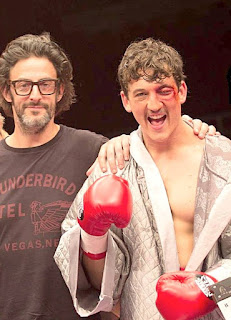
Bleed for This is unremitting in its toxic masculinity. Miles Teller plays Vinny Pazienza, who held world championship titles at three different weights in the late '80s and early '90s. His story is a classic example of the triumph of the human spirit. After suffering a car crash, he endured a halo, a rack that screwed into his skull, for six months in order to heal. Against all odds, as they say, he eventually recovered and went on to win more championships. Bleed for This is macho taken to the point of existential absurdity. It ends with an interview Pazienza gives when a reporter asks him what the biggest lie in boxing is. His answer is ,"It's not that simple." That's the biggest lie. Because it is that simple. Get it? You just have to want it. Grit is all it takes?

In
On the Waterfront, Terry Malloy, a failed boxer, comes to realize that the masculinity by which he has lived his entire life—the brotherhood of the Union and the boxing ring—is a sham, that he has been destroyed by the toughness he allowed to define him. The point of
Bleed for This is: "Guys gotta be tough, you know?" We are going backwards in a hurry.
Source: www.esquire.com
Men might want to ditch the pickup lines and polish their punchlines in their quest to attract women, new research at the University of Kansas suggests. Jeffrey Hall, associate professor of communication studies, found that the more times a man tries to be funny and the more a woman laughs at those attempts, the more likely it is for the woman to be interested in dating. Those findings were among the discoveries Hall made in his search for a link between humor and intelligence. For the past decade, research has debated whether women appreciate men’s humor, which is often cited as one of the most valued traits in a partner, because it allows them to suss out the smarts of potential mates.

In the article “Sexual Selection and Humor in Courtship: A Case for Warmth and Extroversion,” which was published online in the journal Evolutionary Psychology, Hall discusses three studies he performed that didn’t find a connection between humor and intelligence. The results did suggest the more times a man tried to be funny and the more times a woman laughed at his jokes, the more likely she was romantically interested. The reverse was not true for women who attempted humor.
Men use humor to gauge if women are interested in them. “Men are trying to get women to show their cards,” Hall said. “For some men it is a conscious strategy.” When men make jokes and women laugh, they may be performing a script in courtship. Men acting like jokers and women laughing along may be part of it. Humor is valuable for humor's sake. “Shared laughter might be a pathway toward developing a more long-lasting relationship,” Hall said.
Source: news.ku.edu





























